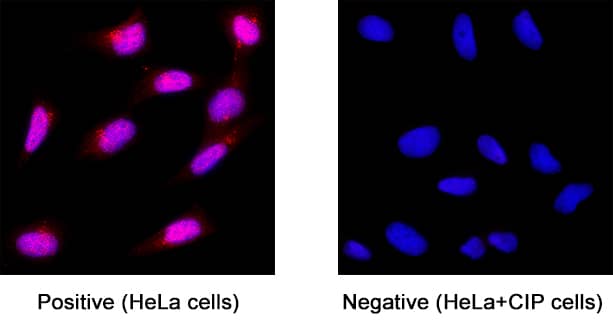Human/Mouse/Rat Phospho-MKK4 (S257/T261) Antibody
R&D Systems, part of Bio-Techne | Catalog # AF2990

Key Product Details
Validated by
Species Reactivity
Applications
Label
Antibody Source
Product Specifications
Immunogen
Specificity
Clonality
Host
Isotype
Scientific Data Images for Human/Mouse/Rat Phospho-MKK4 (S257/T261) Antibody
Detection of Rat and Human Phospho-MKK4 (S257/T261) by Western Blot.
Western blot shows lysates of PC-12 rat adrenal pheochromocytoma cell line untreated (-) or treated (+) with 300 mM sorbitol for 30 minutes and HepG2 human hepatocellular carcinoma cell line untreated or treated with 10 ng/mL Recombinant Human IL-1 beta (201-LB) for 20 minutes. PVDF membrane was probed with 1 µg/mL of Rabbit Anti-Human/Mouse/Rat Phospho-MKK4 (S257/T261) Antigen Affinity-purified Polyclonal Antibody (Catalog # AF2990), followed by HRP-conjugated Anti-Rabbit IgG Secondary Antibody (HAF008). A specific band was detected for Phospho-MKK4 (S257/T261) at approximately 44 kDa (as indicated). This experiment was conducted under reducing conditions and using Immunoblot Buffer Group 2.Detection of MKK4 in HeLa Cells (Positive Control) and HeLa Cells treated with CIP (Calf Intestinal Phosphatase) (Negative Control).
MKK4 was detected in immersion fixed HeLa Human Cervical Epithelial Carcinoma Cells (Positive control) and absent in HeLa Human Cervical Epithelial Carcinoma Cells treated with CIP (Calf Intestinal Phosphatase) (Negative Control) using Rabbit Anti-Human/Mouse/Rat Phospho-MKK4 (S257/T261) Antigen Affinity-purified Polyclonal Antibody (Catalog # AF2990) at 3 µg/mL for 3 hours at room temperature. Cells were stained using the NorthernLights™ 557-conjugated Anti-Rabbit IgG Secondary Antibody (red; Catalog # NL004) and counterstained with DAPI (blue). Specific staining was localized to nuclei and cytoplasm. View our protocol for Fluorescent ICC Staining of Cells on Coverslips.Applications for Human/Mouse/Rat Phospho-MKK4 (S257/T261) Antibody
Immunocytochemistry
Sample: Immersion fixed HeLa Human Cervical Epithelial Carcinoma Cells (Positive control) and HeLa Human Cervical Epithelial Carcinoma Cells treated with CIP (Calf Intestinal Phosphatase) (Negative Control)
Western Blot
Sample: Sorbitol-treated PC-12 rat adrenal pheochromocytoma cell line and HepG2 human hepatocellular carcinoma cell line treated with Recombinant Human IL-1 beta (Catalog # 201-LB)
Reviewed Applications
Read 4 reviews rated 3.8 using AF2990 in the following applications:
Formulation, Preparation, and Storage
Purification
Reconstitution
Formulation
Shipping
Stability & Storage
- 12 months from date of receipt, -20 to -70 °C as supplied.
- 1 month, 2 to 8 °C under sterile conditions after reconstitution.
- 6 months, -20 to -70 °C under sterile conditions after reconstitution.
Background: MKK4
Mitogen-activated protein kinase kinase 4 (MKK4 or MAP2K4), also known as SAPK/ERK kinase 1 (SEK1) and Jun kinase kinase 1 (JNKK1), is activated by proinflammatory cytokines and environmental stresses. Activation occurs through phosphorylation at Ser257 and Thr261 by several upstream MAPK kinase kinases (MAP3Ks). MKK4 is a dual specificity protein kinase, phosphorylating and activating the JNK family of MAP kinases at Thr and Tyr positions within the phosphoacceptor sequence Thr-Pro-Tyr.
Long Name
Alternate Names
Entrez Gene IDs
Gene Symbol
Additional MKK4 Products
Product Documents for Human/Mouse/Rat Phospho-MKK4 (S257/T261) Antibody
Product Specific Notices for Human/Mouse/Rat Phospho-MKK4 (S257/T261) Antibody
The purchase of this product conveys to the buyer the limited, non-exclusive, non-transferable right (without the right to resell, repackage, or further sublicense) to use these reagents for research purposes only. No other license is granted to the buyer whether expressly, by implication, by estoppel or otherwise. In particular, the purchase of this product does not include nor carry any right or license to use, develop, or otherwise exploit this product commercially, which includes without limitation, provision of services to a third party, generation of commercial databases, clinical diagnostics or therapeutics, or drug development. This product is sold pursuant to a license from the University of Massachusetts, and the University of Massachusetts reserves all other rights to use these reagents. For information on purchasing a license for uses other than research, please contact the University of Massachusetts, Office of Technology Management, 333 South Street, Suite 400, Shrewsbury, Massachusetts, 01545.
For research use only

